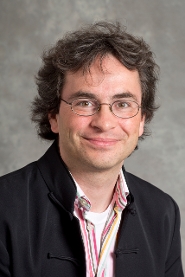Introducing: Bernhard Rieger
Bernhard Rieger recently joined the Institute for History as our new Professor of European History. He introduces himself.

I studied in Erlangen, Oxford and at Humboldt University Berlin for my undergraduate degree before receiving my PhD in history from University College London in 1999. That year, I took up a tenure-track position at Iowa State University, from which I moved to Jacobs University in Bremen in 2003. After two years in Northern Germany, I returned to UCL in 2005, where I was promoted to a chair in 2014. Since 15 January 2018, I have been Professor of European History in Leiden, retaining my link with UCL through an honorary professorship.
My research has placed European history since the late nineteenth century in global contexts. I have paid particular attention to the ways humankind has dramatically reshaped the natural, social and political worlds over the last century. Since these issues cannot be explored within the confines of the nation state, my work has drawn on comparative and transnational approaches.
I have published on Germany, Britain, the USA, and Mexico. My first book examined the fascination for technology that swept Europe between the 1890s and World War II, focusing on the wide-ranging and passionate debates about modernity through which British and German societies construed a cultural climate conduce to technological change. My second book is entitled The People's Car: A Global History of the Volkswagen Beetle (2013) and traces the VW Beetle's journey from failed National Socialist prestige project to lasting prominence in Western Europe, the United States and Latin America. My work has received several awards including the Hagley Prize in Business History, the Binkley-Stephenson Prize from the Organization of American Historians, and a Bessel Prize from the Alexander-von-Humboldt Foundation. I have featured on BBC television and radio programmes and regularly work with museums including the British Museum and Victoria and Albert Museum.
In recent years, my interests have shifted to the proliferation and effects of the market-fundamentalist policies that are often subsumed under the label of neoliberalism. Tentatively entitled “Making Society Work Again,” my current research addresses the history of unemployment since the 1960s and explores changes in welfare policies and their repercussions for individuals in the US, Great Britain and Germany. I am currently exploring a collaborative research projects on the wider theme of neoliberalism with historians at the University of Exeter.
In Leiden, I hope to develop courses with a focus on the twentieth century as well as to play an active role in the research group on “Political Culture and National Identities”. Initial contacts with colleagues here in Leiden have been very promising, and I am looking forward to turning them into concrete projects.
